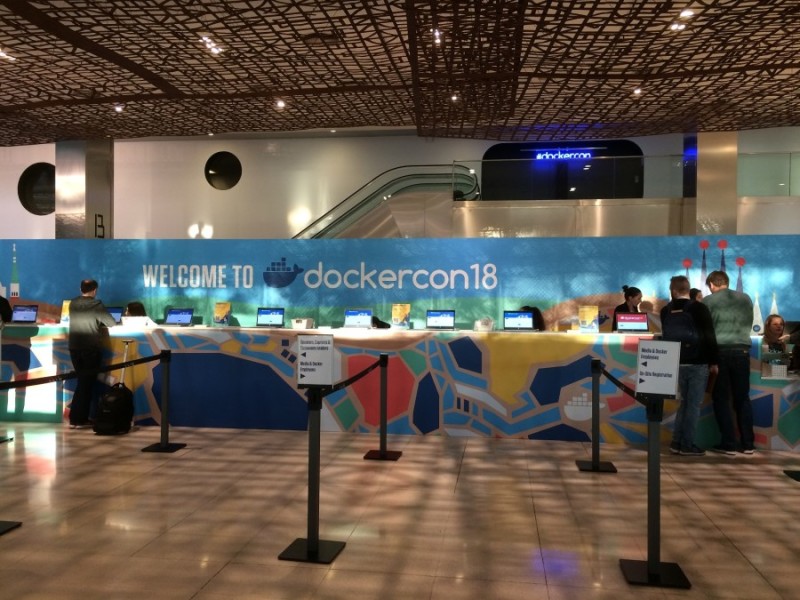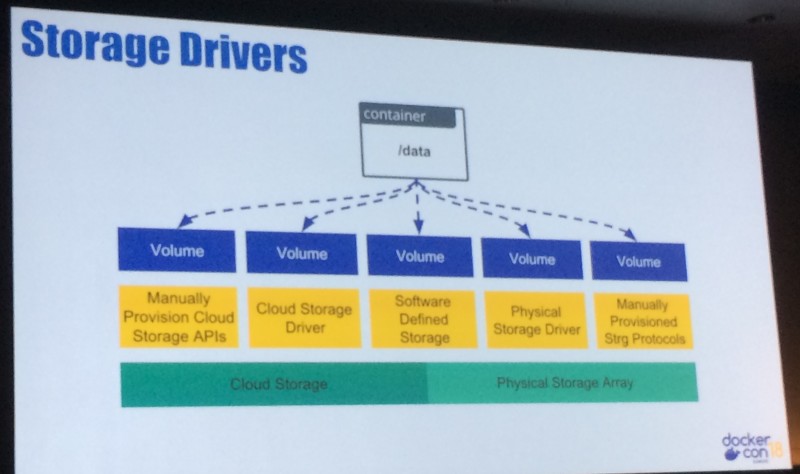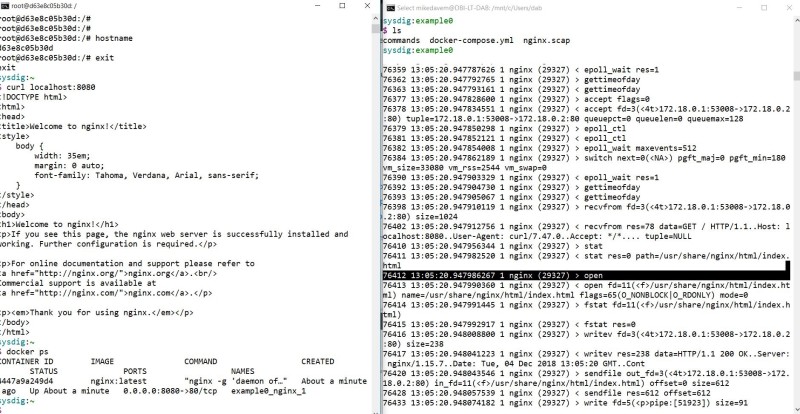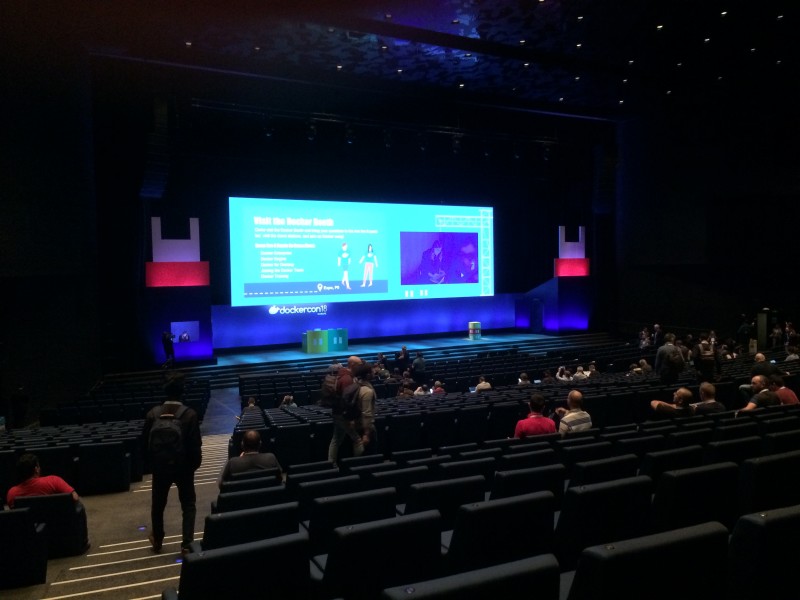In short, a very interesting event for both Devs and Ops. Every day was organized around workshops, hands-on-labs sessions and Hallway tracks. My colleague Mehdi Bada and I tried to attend as much sessions as possible but obviously it was difficult to cover all the topics.

Anyway, workshops and hands-on-labs were very interesting especially if you like to mix theory and practice. But I had to admit sometimes we got in trouble to keep up the pace of some workshops. Regarding the workshop we ran into what I call the “Context switch” issue between following the trainer’s explanation and doing exercises at the same time 🙂 The migrating .NET applications to Docker workshop with Elton Stoneman (Docker) was one that comes I mind in this case 🙂
As database specialists at dbi services we obviously had a special focus on storage-oriented topics and we were interested in attending sessions and workshops on this topic including Use Cases and Practical Solutions for Docker Container Storage on Swarm and K8s session with Don Stewart (Docker) and Mark Church (Docker) as well as Container Storage Panel Q&A with Ed Beauvais (Oracle), Chris Brandon (Storage OS Inc) and Keith Hudgins (Docker). We got an overview of different possible solutions to implement as file-based, block-based and object-based storage in order to address different pattern workloads including fileserver, OLTP, BigData etc. Container Storage Landscape is large and vendor-specific actually but Docker storage team announced some plans to introduce first snapshot / restore capabilities and to provide an CSI (Common Storage Interface) to offer a simple community driven approach and a more predictable and functional interface for most common use cases as well. Let’s see what’s happen in the future but my guess (speculation mode) is that for “specific” applications like databases, vendor storage drivers will likely remain the most viable option when performance will be at the heart of concerns.

Even if containers are formally design to handle stateless applications it is not uncommon to see databases in such infrastructure nowadays. After all databases are also (special) applications, right? I was already convinced by the fact that containerization infrastructure was now enough mature to handle database workloads, these sessions reinforced my strong belief that Docker Swarm or K8s are production database ready from a storage perspective at least.
We also got the opportunity to attend to workshops and sessions around container orchestrator topics including mainly Docker Swarm and K8s orchestration. It was interesting to see that the same question often raised by attendees during these sessions: Do we have to use Swarm over K8s and vice-versa-ca? This is also a question we are going to ask for a dbi services internal project by the way and obviously, there is no black-or-white response. What is certain is that Docker Swarm remains important for customers as confirmed by Steve Singh during the first general session on Tuesday 4th December 2018. We got feedback from customer stories like Citizens bank that an orchestrator choice depends on different factors and in the context of this customer, they are using the both from Docker EE 🙂 We also attended to other interesting Swam and K8s infrastructure topics including Swarm Orchestration – features and workflows by Bret Fisher (Docker Captain) and Container Networking for Swarm and Kubernetes in Docker Enterprise by Guillaume Morini (Docker) as well. Finally, and probably one of my favorite workshops was troubleshooting with sysdig by Michael Ducy. Sysdig is part of well-known monitoring / troubleshooting tools for containers in the market. Let’s say that it was a subtle combination between deep dive immersion of Linux kernel principals and practical scenarios about using sysdig tools to fix container issues as confirmed by my working desktop below:

In addition to sessions, workshops and hands-on-labs, new announcements were done at the DockerCon EU 2018, during general sessions with Steve Singh (CEO) and Scott Johnston (Chief Product Officer) as main speakers.

First general session announcements include new innovative tools including docker-app, docker-assemble and enhancement of docker stack support for both Swarm and Kubernetes since Docker EE 2.0 and probably the most expected one: Docker Desktop Enterprise. It turns out that the adoption of Docker Desktop from developers was a real success but not really designed to scale to Enterprise-class environment and this is basically what Docker Desktop enterprise product is supposed to address.
It was also an opportunity to get some interesting figures about Docker (EE) adoption across the world:
- 1M of new developer
- 5M of new applications
- 1B of containers downloaded every week
- 650+ customers on docker EE
- 76.4% of companies running mission-critical apps in containers in production
The last one is by far my favorite because it highlights that most of Docker environments are not anymore developer-scoped limited environments. Moreover, it is worth noting that the other following figures seem to point out that Docker is not a visionary developer whim anymore and it drives a strong adoption for customer due to an interesting ROI:
- 69% differentiating products and services vs competitors
- 70% => increasing sales of product
- 71% bringing products to market faster
Finally, let’s finish with the second general session that was more Docker community-oriented and I know how important community may be for contribution and to bring people for interaction as well. As Microsoft with MVPs, Docker Captains are the Docker counterpart and were thanked for their wonderful contribution during this event. But obviously contribution is beyond MVPs, ACEs or Docker captains and Kal De (CTO, EVP, Product Development) explained how to contribute to different Docker projects and showed then contribution figures from the community through GitHub:
- Compose 1 MM monthly
- 25K new compose files published on GitHub per week
- 14K GitHub contributors – 280+ people
This first immersion in the Docker World conference was definitely a good experience and a great opportunity to feel the emphasis around Docker and future directions made by the company. I also appreciated discussions and feedbacks from some attendees during network track to prepare our future challenges on this topic.
By David Barbarin
![Thumbnail [60x60]](https://www.dbi-services.com/blog/wp-content/uploads/2022/12/microsoft-square.png)
![Thumbnail [90x90]](https://www.dbi-services.com/blog/wp-content/uploads/2022/10/JPC_wev-min-scaled.jpg)
![Thumbnail [90x90]](https://www.dbi-services.com/blog/wp-content/uploads/2023/03/KKE_web-min-scaled.jpg)
![Thumbnail [90x90]](https://www.dbi-services.com/blog/wp-content/uploads/2022/08/OLS_web-min-scaled.jpg)